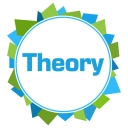I often hear from people who have no time for 'theory'.
"Just give us practical strategies for use in the 'real world'" they say.
Then when I ask them if they would prefer to be constantly reacting to situations and events or to develop the capability to control those events, they usually agree that gaining some leverage would be a very practical and useful thing to do in the 'real world'.
Enter theory!
Events (behaviours, actions, people, what happens...) are the minutiae of our daily life. We can only react or respond to these.
To get a little more leverage we might look for patterns of events. Identifying patterns helps us to anticipate events and adapt to them, but we are still hardly in control. Once we begin to look for patterns or explanations, we are theorizing.
Even more leverage is created when we see how systems create these patterns. Once we can think at a systems level we are seeing cause and effect, purpose and interaction. This is a more powerful view of reality because it enables us to begin to see why things happen and how we can find creative ways to gain more control.

Examining the mental models implicit in a system is an even more powerful perspective. It allows us to examine and question the values and beliefs that influence our perceptions and actions about how the world works. This level is reflection - a level at which our control increases dramatically.
Finally, examining and changing our mental models by envisioning how the world might be different enables us to bring something new into being and change the nature of 'reality'.

All of these levels of 'theory' are powerful ways of understanding and conceptualizing the practical situations that we encounter in the world and the strategies that we need to assist us in managing them.
W. Edwards Deming wrote:
"Theory leads to prediction. Without prediction, experience and examples teach nothing" 1
"To copy an example of success without understanding it with the aid of theory may lead to disaster. Theory is the window into another world". 2
1 W. Edwards Deming, Out of the Crisis (MIT Center for Advanced Engineering Study, 1982 revised 1986)
2 W. Edwards Deming. 'The New Economics for Industry, Education, Government (MIT Center for Advanced Engineering Study, 1993)
1 Edward L. Deci 'Why We Do What We Do', Penguin, 1995.
2 Edward L Deci: 'Promoting Optimal Motivation, Wellness and, Effective Behaving', WGIA Conference, Newcastle, 30th September 2017.
Rob Stones is a Senior Faculty Member of the William Glasser Institiute. See more info at
Choice Theory










